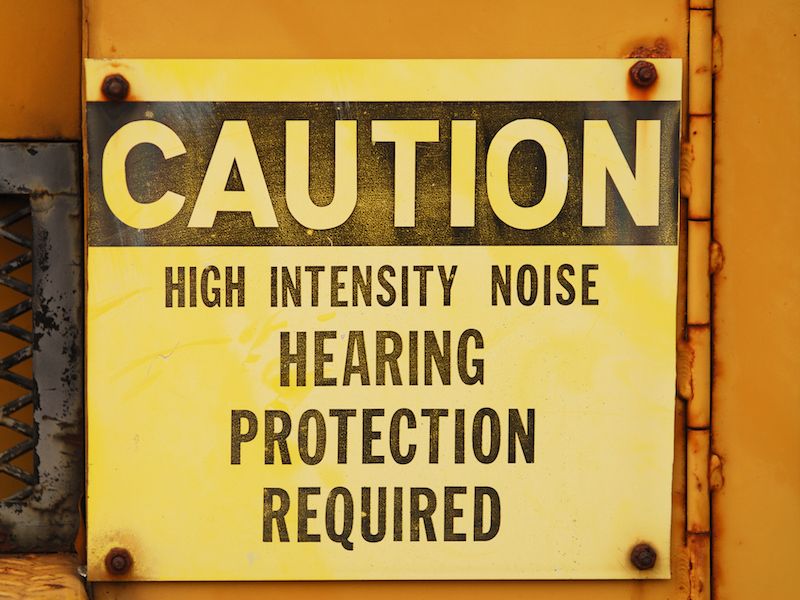
It’s one thing to know that you should protect your hearing. Knowing when to protect your ears is another matter. It’s more challenging than, for instance, knowing when you need sunblock. (Is the sun out and will you be outdoors? Then you need sunscreen.) It’s not even as simple as determining when to use eye protection (Handling dangerous chemicals? Doing some construction? You need to wear eye protection).
When it comes to when to wear hearing protection, there seems to be a big grey area which can be dangerous. Unless we have particular information that some activity or place is hazardous we tend to take the easy road which is to avoid the issue altogether.
A Tale of Risk Assessment
In general, we’re not very good at assessing risk, especially when it comes to something as intangible as injury to the ears or the risk of long term sensorineural hearing loss. Here are some examples to prove the point:
- A very loud rock concert is attended by person A. The concert lasts around 3 hours.
- A landscaping business is run by person B. She spends a significant amount of time mowing lawns, then she goes home to a quiet house and reads a book.
- Person C works in an office.
You may think the hearing hazard is greater for person A (let’s just call her Ann). For most of the next day, her ears will still be screeching from the loud concert. Presuming Ann’s activity was risky to her hearing would be fair.
Person B (let’s just call her Betty), on the other hand, is exposed to less noise. There’s no ringing in her ears. So it has to be less hazardous for her hearing, right? Well, not quite. Because Betty is mowing every day. So even though her ears don’t ring out with pain, the injury builds up slowly. If experienced too often, even moderately loud sounds can have a detrimental affect on your ears.
Person C (let’s call her Chris) is even less evident. The majority of people recognize that you should safeguard your hearing while using equipment such as a lawnmower. But while Chris works in a quiet office, she has a really noisy, hour-long commute each day through the city. Additionally, while she works behind her desk all day, she listens to her music through earbuds. Does she need to think about protection?
When is it Time to Worry About Safeguarding Your Ears?
The normal guideline is that if you have to raise your voice to be heard, your environment is loud enough to do injure to your hearing. And if your environment is that noisy, you really should think about using earplugs or earmuffs.
So to put this a little more clinically, you should use 85dB as your limit. Noises above 85dB have the capacity to cause damage over time, so you need to think about using ear protection in those circumstances.
Most hearing specialists recommend getting a specialized app to keep track of decibel levels so you will be aware when the 85dB has been reached. These apps can tell you when the ambient sound is nearing a harmful level, and you can take suitable steps.
A Few Examples
Your phone might not be with you wherever you go even if you do get the app. So we may establish a good standard with a few examples of when to safeguard our hearing. Here we go:
- Listening to music with earbuds. OK, this doesn’t require protection but does require care. Whether your music is going directly into your ears, how loud it’s playing, and how long you’re listening to it are all things you should pay attention to. Think about using headphones that cancel out outside noise so you don’t need to turn up the volume to dangerous levels.
- Exercise: You know your morning spin class? Or perhaps your daily elliptical session. You may consider using hearing protection to each. The loud volume from trainers who play loud music and microphones for motivation, though it may be good for your heart rate, can be bad for your ears.
- Residential Chores: We already talked about how something as basic as mowing the lawn, when done often enough, can call for hearing protection. Cutting the grass is a great illustration of the kind of household task that could cause injury to your hearing but that you most likely won’t think about all that often.
- Using Power Tools: You know you will need hearing protection if you work all day in a factory. But how about the hobbyist building in his workshop? Even if it’s only a hobby, hearing specialists recommend wearing hearing protection if you’re utilizing power equipment.
- Driving & Commuting: Driving all day as an Uber or Lyft driver? Or maybe you’re taking a subway after waiting for a little while downtown. The noise of living in the city is bad enough for your ears, not to mention the extra damage caused by cranking up your tunes to drown out the city noise.
These examples may give you a good baseline. When in doubt, however, you should defer to protection. In the majority of cases, it’s better to over-protect your ears than to leave them exposed to possible injury in the future. If you want to be able to hear tomorrow, protect today.
